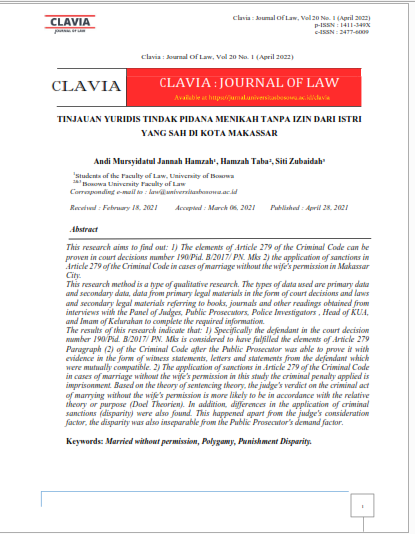TINJAUAN YURIDIS TINDAK PIDANA MENIKAH TANPA IZIN DARI ISTRI YANG SAH DI KOTA MAKASSAR
JURISDICTION OF THE CRIMINAL ACTION OF MARRIING WITHOUT PERMISSION FROM THE LEGAL WIFE IN MAKASSAR CITY
DOI:
https://doi.org/10.56326/clavia.v20i1.1418Keywords:
Married without permission, Polygamy, Punishment DisparityAbstract
This research aims to find out: 1) The elements of Article 279 of the Criminal Code can be proven in court decisions number 190/Pid. B/2017/ PN. Mks 2) the application of sanctions in Article 279 of the Criminal Code in cases of marriage without the wife's permission in Makassar City.
This research method is a type of qualitative research. The types of data used are primary data and secondary data, data from primary legal materials in the form of court decisions and laws and secondary legal materials referring to books, journals and other readings obtained from interviews with the Panel of Judges, Public Prosecutors, Police Investigators , Head of KUA, and Imam of Kelurahan to complete the required information.
The results of this research indicate that: 1) Specifically the defendant in the court decision number 190/Pid. B/2017/ PN. Mks is considered to have fulfilled the elements of Article 279 Paragraph (2) of the Criminal Code after the Public Prosecutor was able to prove it with evidence in the form of witness statements, letters and statements from the defendant which were mutually compatible. 2) The application of sanctions in Article 279 of the Criminal Code in cases of marriage without the wife's permission in this study the criminal penalty applied is imprisonment. Based on the theory of sentencing theory, the judge's verdict on the criminal act of marrying without the wife's permission is more likely to be in accordance with the relative theory or purpose (Doel Theorien). In addition, differences in the application of criminal sanctions (disparity) were also found. This happened apart from the judge's consideration factor, the disparity was also inseparable from the Public Prosecutor's demand factor.












